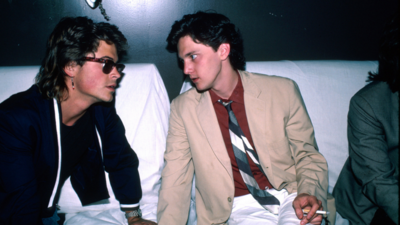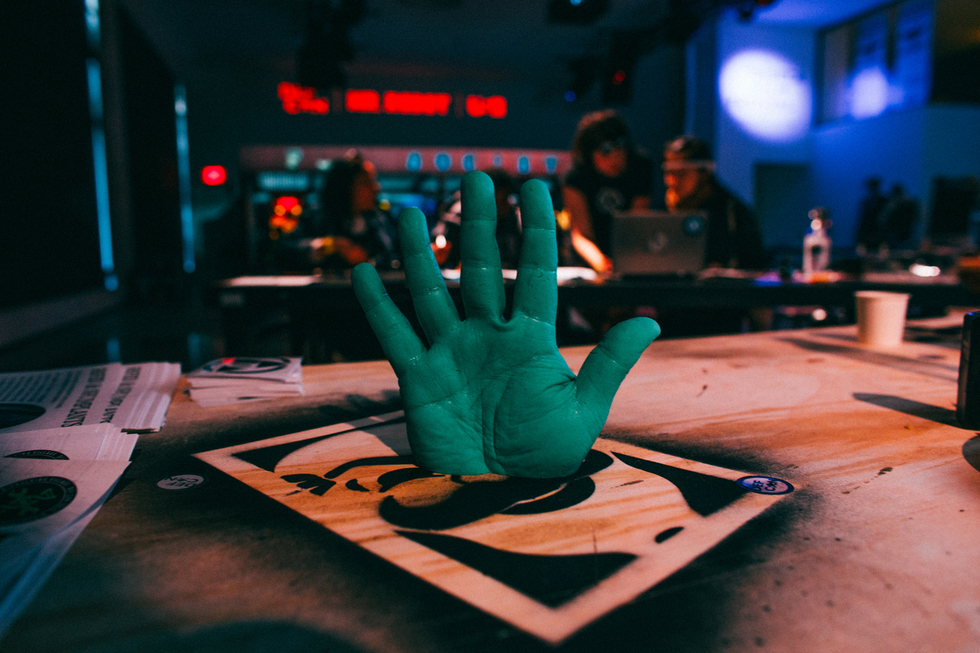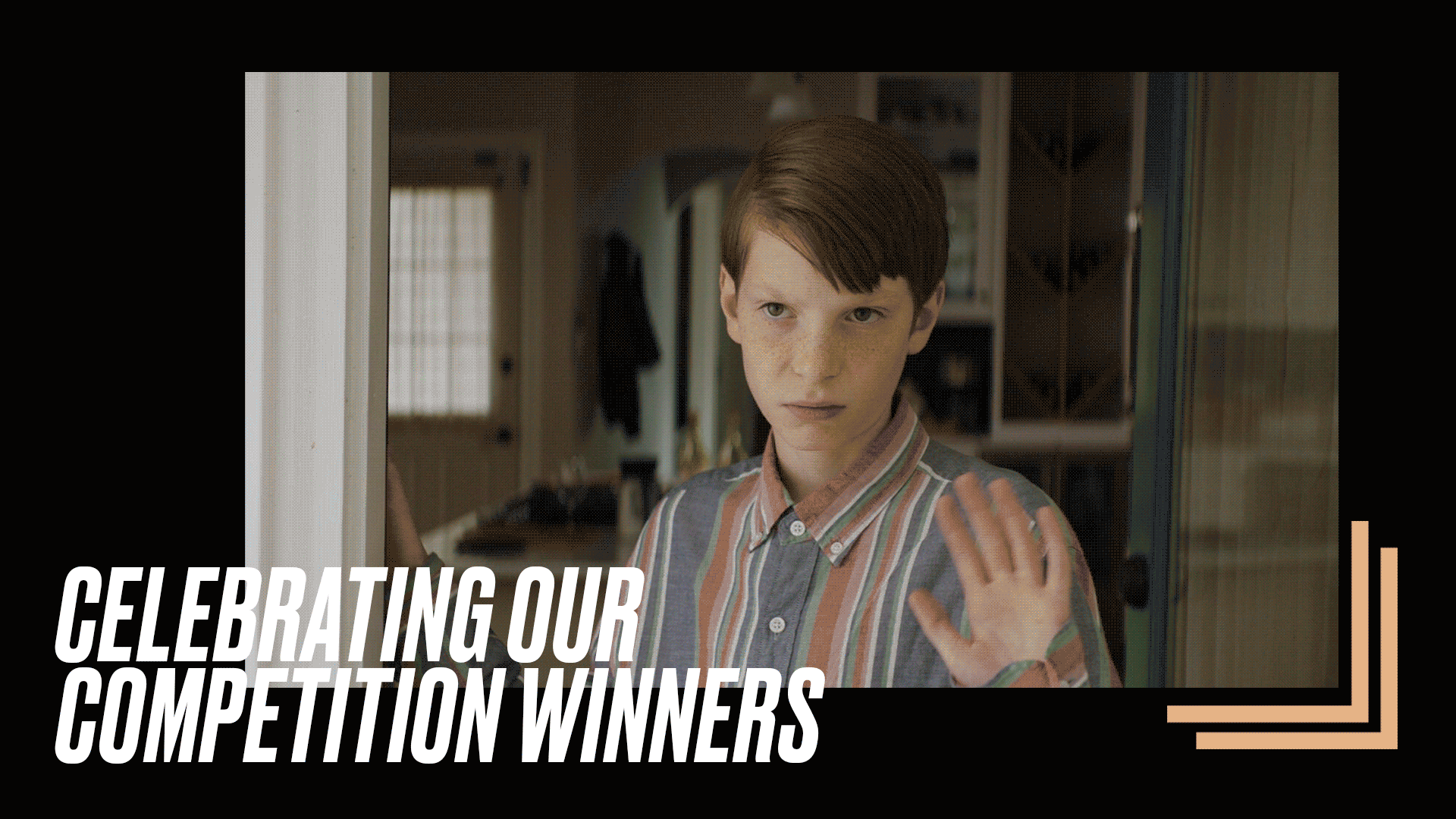
BY MELINA GILLS |
TFI Interactive Conference Presents Stunning Storytelling Innovations at Tribeca 2016
Immersive storytelling was front and center at one of the Tribeca Film Festival's most progressive events.

Organized by the Tribeca Film Institute, yesterday’s TFI Interactive Playground was an all-day immersive event at Tribeca 2016, supported by Time Warner Foundation. It was divided into three sections that included the Conference, Interactive Playground, and MakerSpace, which featured leaders from Black Lives Matter and IBM as well as the filmmakers behind the TFI-funded new media projects Notes on Blindness and The Argus Project.
Opeyemi Olukemi, the Senior Director of Interactive Programs at TFI, gave the opening remarks at the conference, which consisted of a series of ten-minute presentations by industry leaders and pioneers that included Matt Johnson, CEO and Co-Founder of Bare Conductive; Joanna Peña-Bickley, Global Chief Creative Officer at IBM Interactive Experience; Dr. Doron Friedman, Senior Lecturer; Sammy Ofer, School of Communications, IDC Herzliya; and Jeff Moss, a.k.a. Dark Tangent, the founder of DEF CON and Black Hat.

Mariana Santos, Director of Interactive at Fusion and Knight International Journalism Fellow, discussed an array of projects that use interactive storytelling as a means to powerfully address human rights issues across the world. She first highlighted the "Stop Telling Women To Smile," a Brooklyn-based initiative that aims to tackle the prevalence of street harassment and femicide. Another highlighted website immerses readers into personal stories to bring awareness to abortion-related rights.
Santos emphasized "giving voice to people without a voice" and creating platforms for "underrepresented stories" through Fusio's media projects. She discussed the 19 Million Project, which brings journalists and activists together for design-based solutions to the refugee crisis. Santos will be speaking at the United Nations next week on this very subject. She lastly brought virtual reality into the picture, stating that Fusion will soon be using this emerging technology as yet another tool for socially conscious visual and interactive storytelling.
Dark Tangent, the founder of the Black Hat and DEF CON computer hacker conferences discovered hacking at 15 years old. Dark Tangent spoke about how from a young age, despite not being allowed to drink or smoke, he knew people of various ages from all around the world and had a greater understanding of he world thanks to his hacking activities. The dissonance between societal rules and his personal abilities greatly affected his world-view. "Understanding how systems work is true power, and the rest of us are along for the ride," said Dark Tangent. "The way you see the world and the way it operates are two different things. And there's nothing standing in the way of your understanding."
Throughout the TFI Interactive conference each of the speakers addressed various systems and broke down how they work and don’t work. Each new systemic illumination repositioned us, the viewers, as actors in a world we had the power to improve.
Samuel Sinyangwe, a policy analyst, data scientist, and co-founder of Campaign Zero, spoke about the problem of police brutality in America and highlighted its ubiquity. He pointed to the necessity of reimagining community in order to crowd-source information about experiences and collect information the government neglects tracking. Sinyangwe's Campaign Zero leverages statistics to show the problem of police brutality is systemic and disproportionately affects black people. Campaign Zero then proposes a ten-step plan to enact positive change and reduce excessive force. "To date," said Sinyangwe, "27 states signed into law legislation for police accountability."
Mike Kamber, a war photographer and co-founder of Bronx Documentary Center, moved to the Bronx in the 1980s and noticed how representations of the Bronx were very one-sided and simplistic. He was frustrated because, as he put it, "the Bronx is a fantastically complex place and it always has been." When he started planning the Bronx Documentary Center he was told by non-profit professionals it wouldn't work in the Bronx and that he would need to show more than documentaries or people wouldn't be interested. What he found instead was a community lying in wait, and many eager audiences came out and engaged with the documentaries he screened.
He now teaches kids how to shoot films, gives them technical training, and takes them to demonstrations and rallies around the city. By teaching them to ask the hard questions and putting a camera and recorder in their hands, h'’s giving power back to the Bronx so that it can claim its own story—the story popular culture ignores.
Jessica Brillhart, the principal filmmaker for VR at Google, spoke about how the power of empathy is boosted by authenticity. She says that filming among people who are familiar with you offers a more real version of that slice of life on camera. This will, in turn, foster greater empathy in the audience because they'll be closer to really connecting with the subjects. "Empathy has a lot more power when you’re a part of the community you're filming," said Brillhart, "as opposed to being objectified and out of place when you come to film."
Although each of the speakers had different areas of expertise, they all shared a vital kernel of truth: The power to be seen and heard is within our grasp, and we can utilize the power of modern technology to get there.

